We had another excellent time at the Great Plains Audio Club Meeting Saturday, hosted by Mark Margiotta and his lovely wife Dawne. They spoiled us with barbequed chicken and hamburger, and enough finger foods to feed a small nation. In fact, I found myself nibbling so much that I was full before the barbeque was done. Many thanks, Mark and Dawne!In attendance was Forrest Merrill, Mark Fitzgerald, Chuck Adamson, Akhilesh Bajaj, Bob Russell, Phil Wilson, me and our hosts Mark and Dawne. We had two systems setup, a high-power tube home theater system with Magnaplanars and a low-power SET system with seven π cornerhorns.
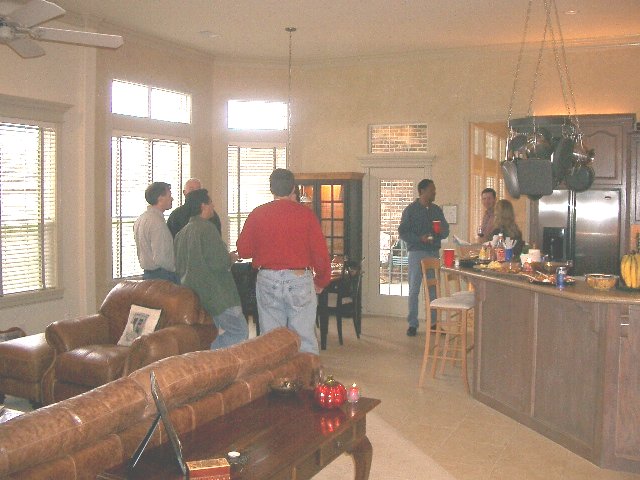
A full spread, with everyone eating and visiting - Phil Wilson (back turned, red shirt), Akhilesh Bajaj (green shirt, standing next to Phil), Forrest Merrill (white shirt, next to Akhilesh), Bob Russell (behind Akhilesh), Chuck Adamson (blue-green shirt, red cup), Mark Margiotta (next to Chuck) and Dawne Margiotta (next to Mark)
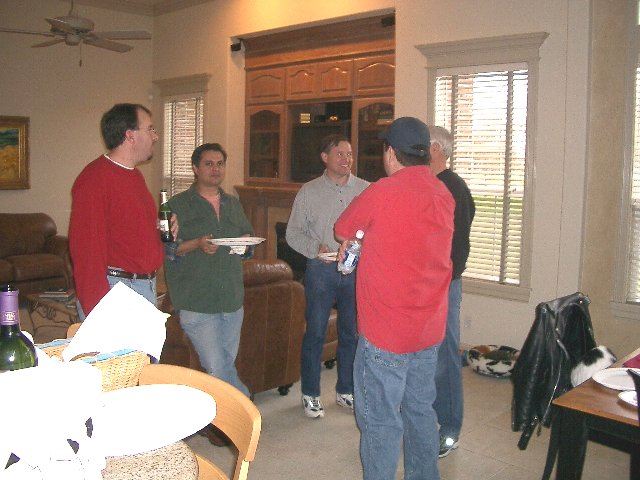
Phil Wilson (left, red shirt), Akhilesh Bajaj (left, green shirt), Forrest Merrill (white shirt), Mark Fitzgerald (red shirt, back turned) and Bob Russell (green shirt, behind Mark)
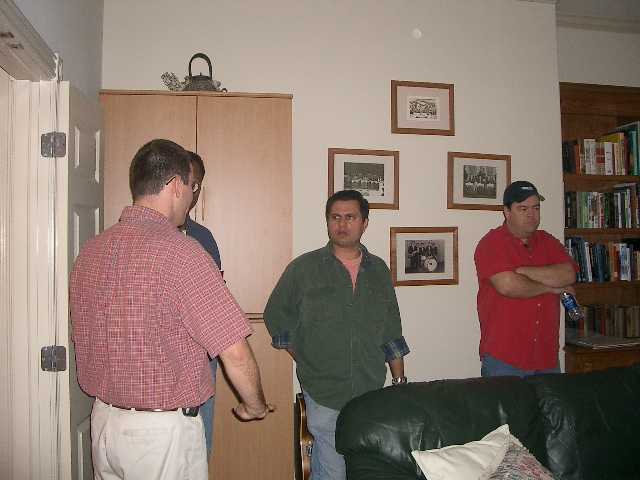
Mark Margiotta (back to us), Chuck Adamson (behind Mark), Akhilesh Bajaj (green shirt) and Mark Fitzgerald (red shirt)
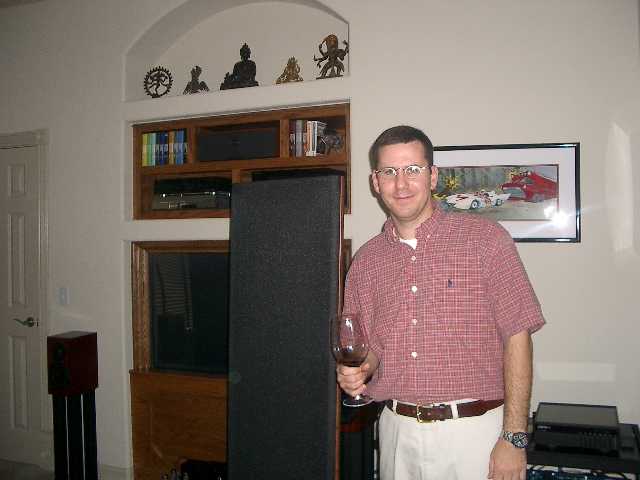
Our host, Mark Margiotta, standing near his tubes and planars home theater system
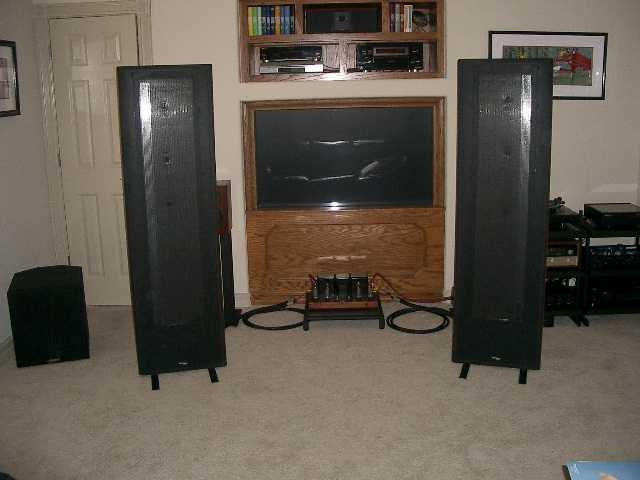
Mark's Home Theater System
This system sounded very good, having ample power from the amplifier to generate room-filling sound. The bass is augmented by subwoofer, and there are small surround speakers to complete the experience. Planars are interesting in that they are like an array or a very large single driver configured as a dipole. They are very directional and sound most pleasant when you sit directly in front of the speaker panels, perpendicular to each plane.
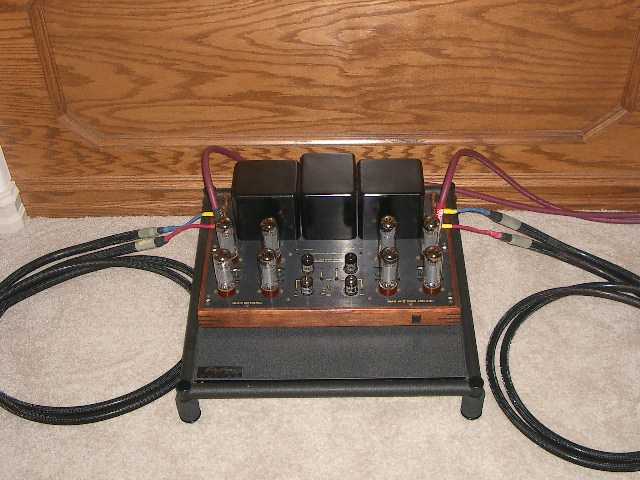
Music Reference RM9 amplifier
This is the Music Reference RM9 amplifier that powers Mark's Magneplanars. I really like this amplifier, and both Mark and Bill Epstein (famous for Bill and Bill's cabintry seminar) tell me interesting things about the designer and builder of this amplifier. One of these next meetings, I've got to hear it connected to a pair of π cornerhorn speakers.
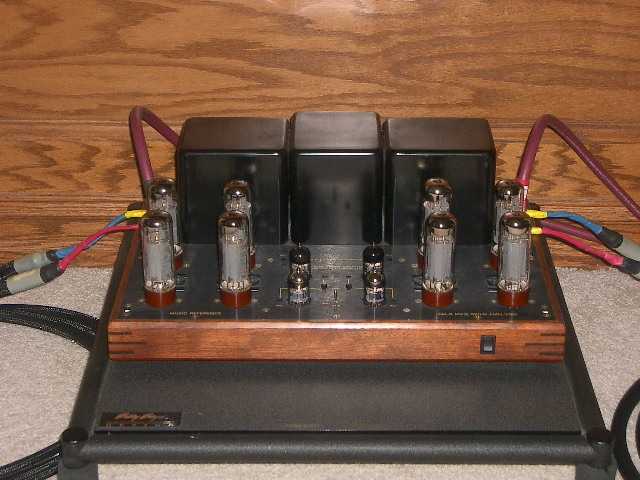
Close-up view of the Music Reference RM9 amplifier
It's a beautiful amplifier, isn't it? It sounds as good as it looks.
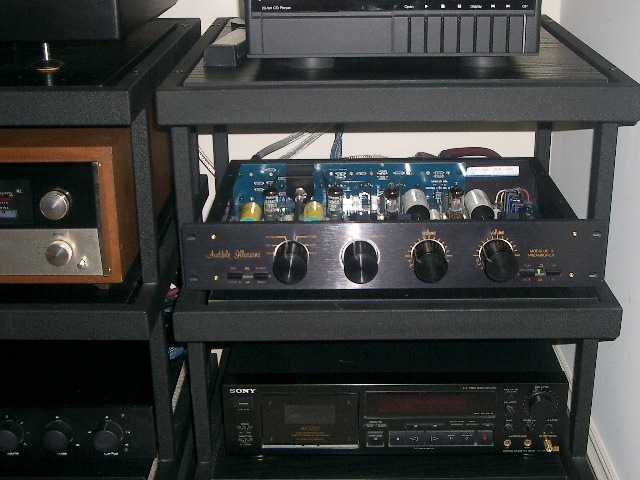
Audible Illusions preamp, used to drive the Music Reference RM9 amp.
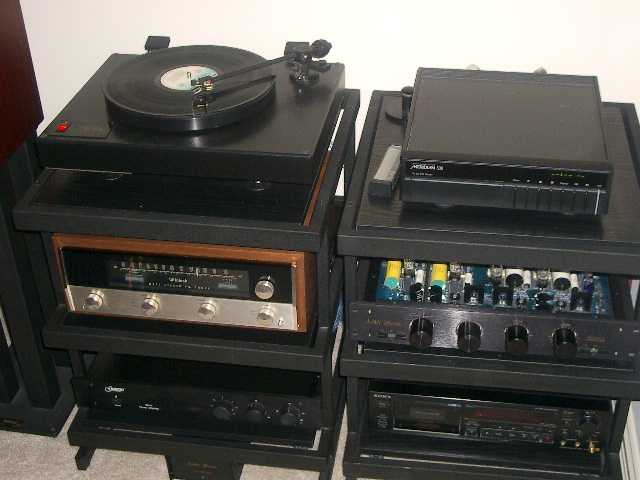
Turntable, cassette and the rest of the system
Nice turntable, although I don't recall the brand or the cartridge used. But Mark has plenty of vinyl for this unit. And he is also running a Sony cassette deck, which wasn't used. One of the real beauties here is the McIntosh receiver shown. This one is in particularly good shape, with all the chrome inside beautifully polished. McIntosh lovers would really drool for this one; For that matter anyone can't help but be impressed with its clasic style.
Mark's system represented a fine example of an audiophile quality tube/planar system. The minimum power for a system like this is really 100 watts in order to generate 105dB/M. That's a rather loud volume in a medium sized room of maybe 500ft2. Not concert levels, but plenty loud.
In the other room, we had the opposite end of the spectrum, which is a horn system using very low power. To reach 105dB/M here only requires about 2.5 watts, and some of the entry level SET kits were used. Specifically, I brought Bottlehead Paramour monoblocks and Phil Wilson brought a Decware Zen.
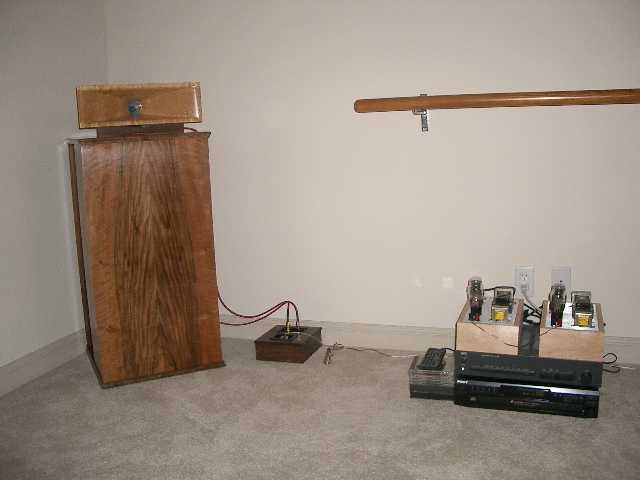
Stage Series seven π Speakers and Paramours
For starters, we connected the Paramours to the seven π's, using a NAD C160 preamp and a Sony CE345 CD changer. The sound is wonderful, with bass that is fuller and cleaner than typical for a SET amp on woofers like are used in the Stage Seven π's. They have pretty high impedance swings in the resonance region, which effects bottom octave linearity on SET amps.
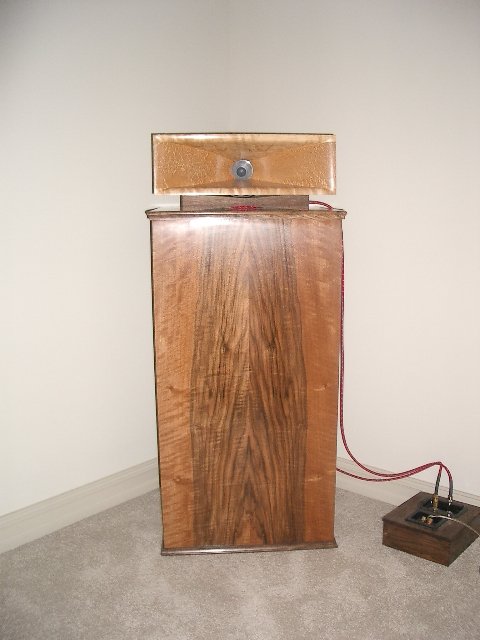
Close-up view of the Stage Series seven π Speakers, showing the crossover box (bottom right)
I'm still impressed with the beauty of these speakers. All credit goes to Bill Martinelli, who makes the cabinets and wood horns.
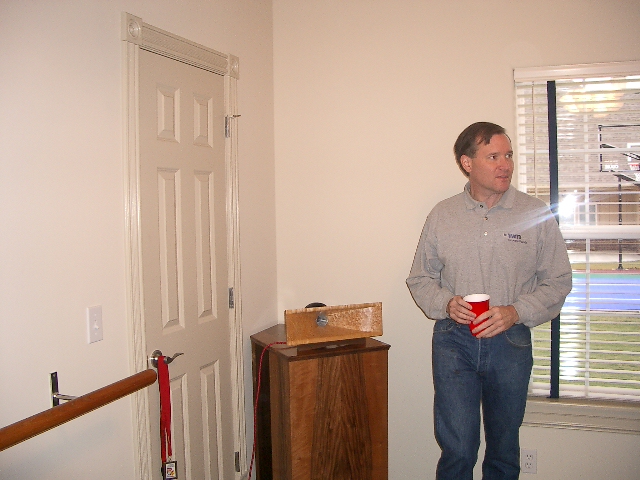
Forrest Merrill standing next to the seven π loudspeaker
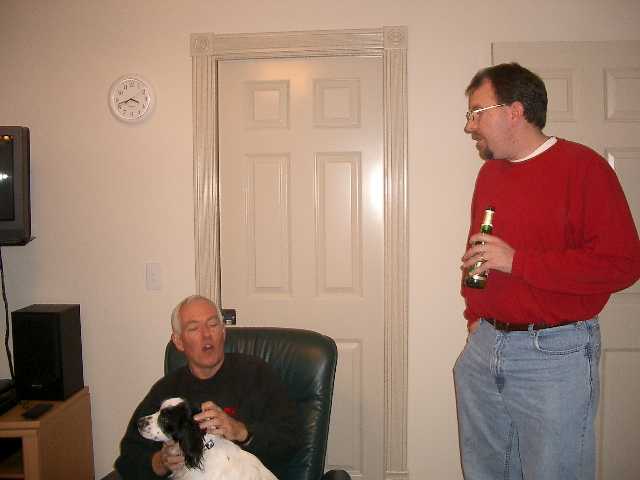
Bob Russell and Phil Wilson in the π room
Mark and Dawne's dog "Bogey" is sitting on Bob's lap. This dog was so friendly, and he loves attention!
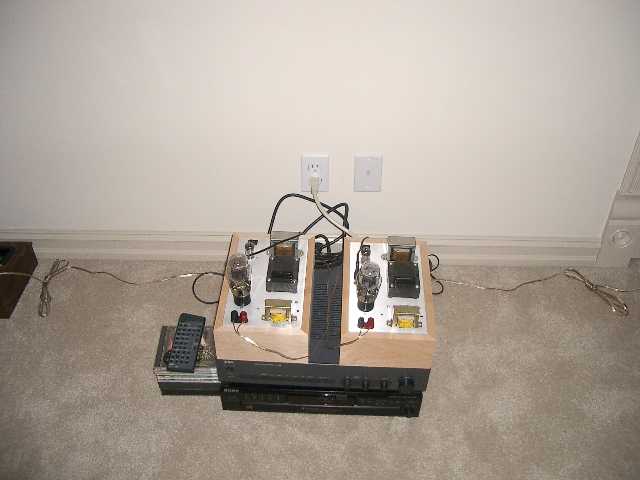
Close-up view of the Paramours
Not a very glamorous shot of these fine little amps, but then again, they aren't pretentious anyway. An attractive build-up would include covers for the transformers and perhaps attention to the base. But they sure sound good.
Bill Epstein graciously loaned me a passive attenuator, and I considered using it here in the spirit of a "minimalist" approach. But when sourcing with a stock Sony CD player, I couldn't help but feel that invalidated any minimalist intent. I've purchased Jerrod Harden's Foreplay preamp and ordered a Seduction phono stage, so I'll be able to put together a system that's all tubes from pickup cartridge to speaker voice coil very soon.
As an aside, on the "minimalist" theme, I had an engineer friend in the 70's that was truly my first mentor. My first introduction to microprocessors was through him, and was only shortly after they were invented. And as a sort of gag gift, he super-glued an integrated circuit onto a large shouldered vacuum tube, shaped like a 2A3. On its base, he placed a label that said "microprocessor controlled tube" and it was our own little joke. Every time I play a CD through a tube amplifier, I think of this "microprocessor controlled tube" I was given, so many years ago.
There are a few photographs we neglected to take; Actually more than a few. I was more caught up in listening to the systems, and visiting with friends. But I would have liked to get a photograph of Phil's Zen amp, because it is truly an excellent amplifier and it is very attractive too. But fortunately, we took a photo of Phil's amplifier at the last meeting.

Close-up view of the Decware Zen Select amplifier
Listening impressions:
We listened to music from Natalie Cole, Frank Sinatra and Dianna Krall through both amplifiers. This is really the music that these kinds of systems sound best with, in my opinion. Where normally people visit during events like these, we all found ourselves sitting quietly through several songs during this meeting. But then one of us would make a joke, or get something to eat or drink, and we would all "snap to" and start talking about one thing or another. But for several minutes at a time, a particular pasage would come along and hypnotize us all over again.
Many of us wanted to compare the Paramour and Zen amps since the last meeting. As you might expect, the Paramours delivered deeper, flatter bass. It is particularly insensitive to woofer load, so it did better in this regard. But I think the Zen sounds cleaner in the midrange, and everyone there did too. The Zen guys are all quite proud of their little amps for this reason. They don't hum as much either. But in fairness, the Paramours were stock and many say that improved parts make a big difference.
It isn't surpising that the Zen would have a little trouble in the bottom octave since the Omega 15 used in the Stage seven π speakers generates a lot of back-EMF and isn't recommended for tube amps. You could hear some bass notes louder than others from this combination, as is to be expected from a very small tube amp on a monster-motor speaker.
It should be remembered that this speaker/amp combination has not been recommended, and yet the truth is that the pairing sounded good enough that about half of the people couldn't hear any problems in the bass and prefered the sound overall. The linearity difference was definitely subtle, and many people didn't notice at all. You really had to listen closely to bass note progressions to notice it. But there is a bit less bass overall, and a slight tendency for some bass notes to be louder than others just a little. The up-side of this combination is that the Zen's midrange sounded noticeably cleaner, a unanimous opinion of everyone present. And the amplifier also generates a little less hum.
All-in-all, I think both little amplifiers are an excellent value and very seductive. Their prices are about the same and I think both are an excellent value.
The meeting was a fun time, and everyone there is super nice. Thanks so much to Mark and Dawne for having us!







